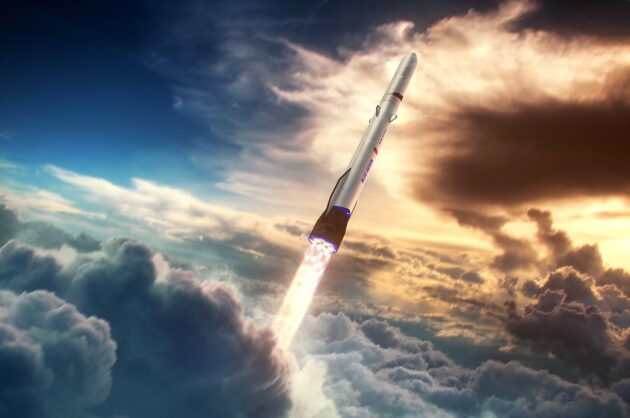
The Department of Defense has put Kent, Wash.-based Blue Origin in the running for a share of up to $5.6 billion in national security space launch contracts, marking a first for Jeff Bezos’ space venture.
The decision means Blue Origin’s orbital-class New Glenn rocket is now eligible to be selected for the Pentagon’s most sensitive launches, joining rockets offered by SpaceX and United Launch Alliance.
The ordering period for what’s known as the Phase 3 Lane 1 procurement process runs through mid-2029, with an optional five-year extension. “This award is the result of a competitive acquisition, and seven offers were received,” the Department of Defense said in today’s contract award announcement.
“We’re honored by the opportunity to compete for these National Security Space Launch Phase 3 Lane 1 missions with New Glenn,” a Blue Origin spokesperson told GeekWire in an email.
Blue Origin’s New Glenn rocket, named after the late NASA astronaut John Glenn, is still under development at the company’s facilities in Florida. New Glenn’s first launch is currently set for no earlier than September. It’s expected to send a pair of robotic probes to study Mars’ magnetosphere for NASA’s EscaPADE mission.
The amounts going to each of the three launch providers in the Phase 3 Lane 1 program will be determined by the task orders that go out for specific launches over the next five years. In a news release, the U.S. Space Force’s Space Systems Command said it was releasing requests for proposals relating to two task orders so far — one that would cover seven launches for the Space Development Agency, and another for the National Reconnaissance Office.
“Any launch provider on the base IDIQ [indefinite-delivery, indefinite-quantity] contract can bid for launch service task orders provided they have completed a successful orbital launch prior to the proposal due date,” the Space Systems Command said.
The Phase 3 program also sets aside funding for each of the providers to conduct an initial capabilities assessment and explain how they’ll approach the Pentagon’s requirements for mission assurance. As a new provider, Blue Origin will receive $5 million, while SpaceX and ULA — which have already been conducting national security launches — will receive $1.5 million each.
Blue Origin has long sought to take part in the multibillion-dollar national security launch program. It lost out in the competition to participate in Phase 2 in 2020.
As part of the Pentagon’s effort to widen competition for national security launches, Phase 3 has been structured to offer contract opportunities in two “lanes.”
“Today marks the beginning of this innovative, dual-lane approach to launch service acquisition, whereby Lane 1 serves our commercial-like missions that can accept more risk and Lane 2 provides our traditional, full mission assurance for the most stressing heavy-lift launches of our most risk-averse missions,” said Frank Calvelli, assistant secretary of the Air Force for space acquisition and integration.
At least 30 Lane 1 missions are expected to be completed over the five-year ordering period, the Space Systems Command said. More providers may be added to the Lane 1 list as their launch capabilities mature. Details about the Lane 2 process — including eligible providers — are to be announced this fall.

